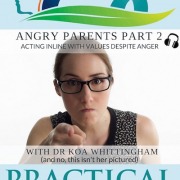Parents, the answer is this: it depends
When I was in the second year of my undergraduate studies in psychology at the University of Queensland, one of my lecturers, Professor Ottmar Lipp (who still teaches at UQ) said something particularly marvellous. He said that every question in psychology has the same answer and the answer is this: it depends. At the time I found this hilarious but now, as a psychologist and researcher, I recognise just how true it is. I also recognise that this answer should be rapidly followed up with another question. Any truly useful application of psychology to help real people, like parents, grappling with real problems, like parenting, needs to ask this: it depends on what? Parents often look to psychology for answers to parenting dilemmas and psychological science can shed light on options for managing many common parenting challenges. Sometimes parents want simple answers – yes, no, less than 3 hours a day. Sometimes psychologists think that they’ll be better understood if they stick to a simple message – praise is good, smacking is bad. I get why this happens but I still think it’s a shame. Parenting day by day isn’t simple. It is really complicated. Our parenting decisions often involve balancing many different considerations and if we never get to the ‘it depends on what?’ it is hard to know how to do the balancing. So parents get stuck in indecision and guilt when their best parenting, in real-life circumstances, doesn’t measure up to the prescribed ideal; e.g. parents feel guilty about their children watching more television than is recommended, even when, due to parental illness or difficult circumstances, the extra television is what is allowing them to still be loving and responsive parents. Parents also follow psychologists’ parenting advice without understanding the ‘it depends on what?’ and so cannot react flexibly to adjust parenting to their unique child, e.g. parents litter their conversation with ‘good boy’ and ‘good girl’ because praise is good and wonder why it isn’t working as well as they expected it to. So, parents, don’t be satisfied with the simple answers. Demand that we also give you the ‘it depends’ story. Ask us: Why is that best? How does that work? What does that depend on? Look for the ‘it depends’ in your own parenting. Sure, you might think that television should be limited. But you might also recognise that how greatly it should be limited today might depend upon whether your child is sick or not, whether you are sick or not, what other challenges your family is facing, whether watching television is a shared activity or not, and what television shows your child is watching. You might think that praising your child is important. But you might also seek information on why and how praise works, understand that how well praise works depends upon how descriptive it is, ensure that your praise is always sincere and actually pay attention to the effects that your praise has upon your unique child and adjust accordingly.
Apply it to your life: Can you find the ‘it depends’ in your own parenting?














Leave a Reply
Want to join the discussion?Feel free to contribute!